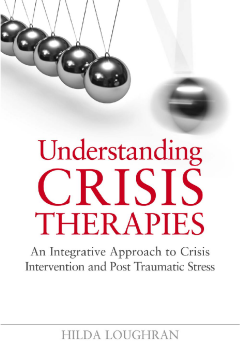
Additional Information
Book Details
Abstract
Events in people's lives can have a profound impact; anything from moving house or losing a job to the death of a loved one or a natural disaster can push an individual into a state of crisis. Crisis intervention is a brief therapy and immediate response which aims to support the person through the crisis period.
This book covers the different influences on crisis therapies and traces the development of crisis theory across its different phases. Each chapter explores a different approach, including psychoanalytic; cognitive, which includes motivational interviewing; systemic; radical; and social construction, which covers solution focused therapy and enhancing resilience. Chapters on the developmental, behavioural, and post-traumatic approaches are also included, and the final chapter illustrates an integrated framework drawing on our knowledge of crisis so far. Case studies are featured throughout to demonstrate the theories and therapies in practice.
This clear guide will assist students and practitioners to understand the different types of intervention and how they relate to the theoretical context. It will be a vital text for all those working with people in crisis, including social workers, counsellors, crisis workers and students in these fields.
This book is aimed at both students and professionals and gives a historical overview of the development of crisis therapies, concluding with the author's own integrated framework for practice. It summarises a number of therapeutic approaches to working with people in crisis - including psychoanalytic, behavioural and radical approaches... this book has added to the crisis therapy literature and provides a very useful overview.
Therapy Today
This book does exactly what it says on the cover. It describes crisis intervention work from seven different theoretical viewpoints to give a well-rounded and informed understanding... It is written in an accessible style and you do not need a prior knowledge of the theories explored to understand it. Every section of the book concludes with a case study, which is really useful in enabling the reader to apply theory to practice... This book is written for mental health workers of all disciplines. It is relevant to mental health nurses, nursing students and applies to most settings. It does not require any prior knowledge but develops ideas to a level that will also be useful to experienced and well-read practitioners.
NursingTimes.net
In today's world of conflict and uncertainty the skills of dealing with sudden emergencies, whether personal or societal, are hugely important. Understanding Crisis Therapies offers social workers and other professionals a wide range of methods suitable for helping people facing serious threats to peace and harmony in their lives. Hilda Loughran explains the theory and practice of brief therapy, and provides strategies that are appropriate across cultures and in different living environments.
John F. Jones, Research Professor and Dean Emeritus, University of Denver Graduate School of Social Work, USA
It's refreshing to find a book on crisis therapies which includes radical and social constructionist perspectives. This is a very original and up-to-date take on the topic. Hilda Loughran has managed to cover an impressive diversity of perspectives which provides a sound overview for any student or practitioner. It is a credible contribution to contemporary work, and one I would surely recommend.
Jan Fook, Professor of Professional Practice Research and Director, Interprofessional Institute, South West London Academic Network, Royal Holloway, University of London, UK
The book succeeds in explaining theoretical concepts relating to crisis therapies in a clear way, and enables critical reflection.
European Journal of Social Work
Hilda Loughran is Lecturer in Social Work at University College Dublin, Ireland, and has taught crisis intervention for over 15 years. Her areas of interest include social work education, counselling and research, and drugs and alcohol misuse, including the use of crisis intervention. She has published widely in these areas, and has been engaged in policy and practice research for many years.
